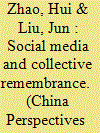| Srl | Item |
| 1 |
ID:
121961


|
|
|
|
|
| Publication |
2013.
|
| Summary/Abstract |
Digital telecommunication technology has expanded the potential of the mobile phone to be used increasingly as a weapon against authoritarian rule and censorship. Since the content of mobile communication is unpredictable and unregulated, mobile phones have the capability to breach state-sponsored blockage of information. This in turn helps the Chinese people to maintain contact with each other, receive information from outside the country, and make political waves in an aggressive battle for control over information. This paper examines spontaneous mobilization via mobile phones, with a focus on two concrete popular protests in rural and urban areas, demonstrating how Chinese citizens have expanded the political uses of mobile phones in their struggle for freedom of information flow, social justice, and the rule of law, while seeking to build an inexpensive counter-public sphere. These processes destabilize China's conventional national public sphere by shaping political identities on an individual level as well as the notion of citizenship within the evolving counter-public sphere. The political significance of mobile phones in the context of contemporary China's political environment can be observed by various social forces that communicate their struggles with the aid of this technology, pose challenges in governance, and force the authorities to engage in new kinds of media practices.
|
|
|
|
|
|
|
|
|
|
|
|
|
|
|
|
| 2 |
ID:
138594


|
|
|
|
|
| Summary/Abstract |
This paper provides one of the first studies on the role of social media in articulating individuals’ experiences and memories and (re-)shaping collective memory in contemporary China. It investigates how social media enable and facilitate the participation of ordinary citizens in distributing and accumulating alternative narratives and memories of the past against the authoritarian version by taking the debate over China’s Great Famine – a topic long considered a political taboo – on Sina Weibo, one of the country’s most popular social media sites, as the case study. This study demonstrates that weibo provides people with an alternative communicative sphere for sharing previously suppressed, marginalised, “unofficial” memories as civil disobedience and accumulating them into an alternative collective memory that is relevant to the changing socio-political context of China.
|
|
|
|
|
|
|
|
|
|
|
|
|
|
|
|